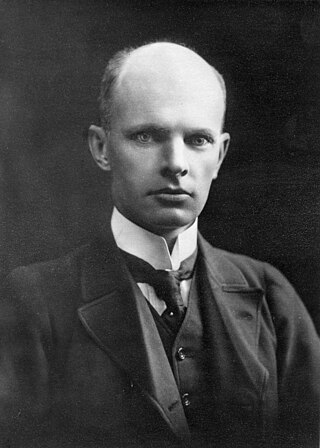Related Research Articles
The Regius Professorships of Divinity are amongst the oldest professorships at the University of Oxford and the University of Cambridge. A third chair existed for a period at Trinity College Dublin.

Sir James Ramsay Montagu Butler, was a British politician and academic. He was a member of parliament for Cambridge University from 1922 to 1923. He was Regius Professor of Modern History at the University of Cambridge from 1947 to 1954, and vice-master of Trinity College, Cambridge, from 1954 to 1960. He also saw military service during both the First and Second World Wars.
Sir George Norman Clark, was an English historian, academic and British Army officer. He was the Chichele Professor of Economic History at the University of Oxford from 1931 to 1943 and the Regius Professor of Modern History at the University of Cambridge from 1943 to 1947. He served as the provost of Oriel College, Oxford, from 1947 to 1957.
Sir Frederick Maurice Powicke was an English medieval historian. He was a fellow of Merton College, Oxford, a professor at Queen's University, Belfast, and the Victoria University of Manchester, and from 1928 until his retirement Regius Professor at the University of Oxford. He was made a Knight Bachelor in 1946.
The Regius Professor of History at the University of Oxford is a long-established professorial position. Holders of the title have often been medieval historians. The first appointment was made in 1724. The term "Regius" reflects the origins of the post as a royal appointment, itself a recognition of the important influence of history.

Lyndal Anne Roper is a historian. She was born in Melbourne, Australia. She works on German history of the sixteenth to eighteenth centuries, and has written a biography of Martin Luther. Her research centres on gender and the Reformation, witchcraft, and visual culture. In 2011 she was appointed to Regius Chair of History at the University of Oxford, the first woman and first Australian to hold this position.
The White's Chair of Moral Philosophy was endowed in 1621 by Thomas White, Canon of Christ Church as the oldest professorial post in philosophy at the University of Oxford.
Ralph Henry Carless Davis was a British historian and educator specialising in the European Middle Ages. Davis was born and died in Oxford. He was a leading exponent of strict documentary analysis and interpretation, was keenly interested in architecture and art in history, and was successful at communicating to the public and as a teacher.

New Inn Hall was one of the earliest medieval halls of the University of Oxford. It was located in New Inn Hall Street, Oxford.

Sir Ernest Barker was an English political scientist who served as Principal of King's College London from 1920 to 1927.
Vivian Hunter Galbraith was an English historian, fellow of the British Academy and Oxford Regius Professor of Modern History.
The Ford Lectures or the James Ford Lectures in British History, are an annual series of public lectures held at the University of Oxford on the subject of English or British history. They are usually devoted to a particular historical theme and usually span six lectures over Hilary term. They are often subsequently published as a book.
Henry Maria Robert Egmont Mayr-Harting is a British medieval ecclesiastical historian. From 1997 to 2003, he was Regius Professor of Ecclesiastical History at the University of Oxford and a lay canon of Christ Church, Oxford.
William Holmes D.D. was an English academic, Vice-Chancellor and Regius Professor of Modern History of the University of Oxford. He was also Dean of Exeter between 1742 and 1748.
John Reginald Homer Weaver was a British historian, academic and architectural photographer. He was president of Trinity College, Oxford, from 1938 to 1954.

William Murray Gloag was a Scottish lawyer and academic. His The Law of Contract, first published in 1914, is considered one of the most authoritative texts on Scots contract law. His two immediate successors in the Regius Chair of Law at Glasgow University described him as "the outstanding jurist of the century" and "the most remarkable legal scholar who has ever held this Chair".
Leopold George Wickham Legg was an English academic historian specializing in diplomatic history.
References
- Weaver, J. R. H.; Matthew, H. C. "Davis, Henry William Carless (1874-1928)". Oxford Dictionary of National Biography (online ed.). Oxford University Press. doi:10.1093/ref:odnb/32746.(Subscription or UK public library membership required.) search online
- ↑ "University intelligence". The Times. No. 36920. London. 8 November 1902. p. 12.